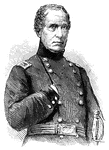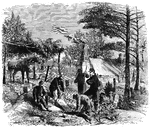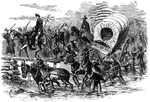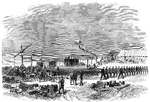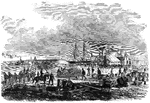
Eighteenth Corps
"The war in Virginia, the Eighteenth Army Corps storming a fort on the right of the Confederate line…
!["The war in Virginia. The Twenty-second [African American] Regiment, Duncan's Brigade, carrying the first line of Confederate works before Petersburg. On the morning of the 15th of June, 1864, General Hinks formed his command in line of battle, and advanced upon the Confederates, with Duncan commanding his right and Holman his left. The result of this charge was waited for with great anxiety. The majority of the whites expected that the [African American] troops would run, but the sable forces astonished everybody by their achievements. With a wild yell that must have struck terror into the hearts of their foes, the Twenty-second and Fifth United States [African American] regiments, commanded by Colonels Kidder and Connor, charged, under a hot fire of musketry and artillery, over the Confederate ditch and parapet, and drove the enemy before them, capturing a large field-piece, and taking entire possession of their works, its defenders, Ferrybee's Fourth North Carolina Cavalry, and Graham's Petersburg Battery, seeking safety in rapid flight, leaving their dead and wounded in the works."— Frank Leslie, 1896](https://etc.usf.edu/clipart/11700/11799/duncan-brig_11799_mth.gif)
Duncan's Brigade
"The war in Virginia. The Twenty-second [African American] Regiment, Duncan's Brigade, carrying the…
!["Siege of Petersburg. The [African American] infantry bringing in captured guns and cheers of the Ohio troops. When the [African American] troops found themselves within the works of the enemy no words could paint their delight. Numbers of them kissed the guns they had captured with extravagant satisfaction, and a feverish anxiety was minfested to get ahead and charge some more of the Confederate works. A number of the [African American] troops were wounded and a few killed in the first charge. A large crowd congregated, with looks of unutterable admiration, about Sergeant Richardson and Corporal Wobey, of the Twenty-second United States [African American] regiment, who had carried the colors of their regiment and been the first men in the works. Our artist gives a sketch of this gallant action."— Frank Leslie, 1896](https://etc.usf.edu/clipart/11800/11801/petersburg_11801_mth.gif)
Siege of Petersburg
"Siege of Petersburg. The [African American] infantry bringing in captured guns and cheers of the Ohio…

Seventeenth Corps
"Sherman's Seventeenth Corps crossing the south Edisto River, S. C., on Pontoons, at Bennaker's Bridge,…
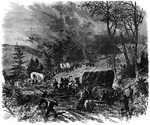
Campaign in Georgia
"The campaign in Georgia. A baggage train crossing the mountains in a storm. General Sherman, after…
!["Assault of the Second Louisiana [African American] Regiment on the Confederate works at Fort Hudson, May 27th, 1863. The Battle of Fort Hudson was a severe and well-fought action. The Federal troops displayed their usual bravery, and were well handled by General Banks, driving the enemy to his second line of works. Of the [African American] regiments General Banks, in his official report, says: 'They answered every expectation. Their conduct was heroic. No troops could be more determined or more daring. They made during the day three charges upon the batteries of the enemy, suffering very heavy losses, and holding their position at nightfall with the other troops on the right of our line. The highest commendation is bestowed upon them by all officers in command on the right. Whatever doubt may have existed heretofore as to the efficiency of organizations of this character, the history of this day proves conclusively to those who were in a condition to observe the conduct of these regiments that the Government will find in this class of troops effective supporters and defenders. The severe test to which they were subjected, and the determined manner with which they encountered the enemy leave upon my mind no doubt of their ultimate success. They require only good officers, commands of limited numbers, and careful discipline to make them excellent soldiers.'"— Frank Leslie, 1896](https://etc.usf.edu/clipart/11800/11805/ft-hudson_11805_mth.gif)
Fort Hudson
"Assault of the Second Louisiana [African American] Regiment on the Confederate works at Fort Hudson,…
Battle of Winchester
"Sheridan's Campaign- Battle of Winchester- position of the Nineteenth Corps, General Emory, September…
Winchester Charge
"Sheridan's Campaign. Battle of Winchester- charge of Crook's Eighth Corps, September 19th, 1864- the…
Confederate Army
"The Confederate army, under early, surprising the Federal forces at Cedar Creek, on the morning of…
Battle of Middletown
"Battle of Middletown, on the afternoon of the 19th of October, 1864. Great victory won by Major General…

Dog at Winchester
"Sheridan's Campaign- an incident at the Battle of Winchester- a faithful dog watching and defending…
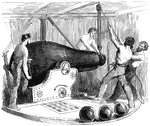
Loading Gun
"Loading a 15-inch gun in the turret of an ericsson ironclad during the attack on Fort Sumter."— Frank…

Blacksmith
"Scene in camp near Falmouth, Va. Army blacksmith shoeing a refractory mule."— Frank Leslie, 1896
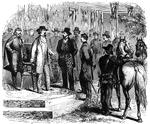
Siege of Vicksburg
"The siege of Vicksburg. General Grant meeting the Confederate General Pemberton at the Stone House,…
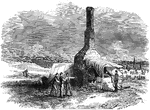
Cookhouse
"Army cookhouse constructed in an old chimney of an outhouse of the Lacy Mansion, on the Rappahannock,…

Kirby Smith
"Voluntary dispersion of Kirby Smith's Confederate army at Shreveport, La., May 23rd, 1865. There was…

Macon Railroad
"Sherman's campaign in Georgia- Federal forces at Jonesborough destroying the Macon Railraod."— Frank…

War in Georgia
"The war in Georgia. Wagon train passing Resaca at night. Our correspondent wrote: 'No general probably…
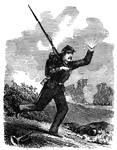
signal with glass
"Signaling with a piece of looking glass. Hints to Soldiers in the camp and on campaign."— Frank…
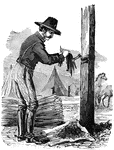
Chaff
"Cutting coarse forage into chaff. Hints to Soldiers in the camp and on campaign."— Frank Leslie,…
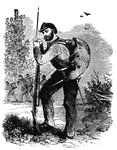
Water Skin
"Water skin and mode of carrying. Hints to Soldiers in the camp and on campaign."— Frank Leslie, 1896
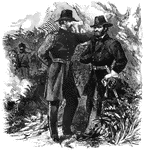
Battle of the Wilderness
"An incident of the Battle of the Wilderness. Lieutenant General Grant and Major General Meade in consultation,…
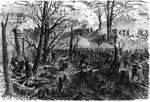
War in Tennessee
"The war in Tennessee. Capture of Mission Ridge, near Rossville, by General Thomas, November 25th, 1863.…
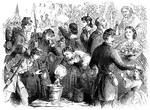
Daughters of Maryland
"How the Daughters of Maryland received the Sons of the North as they marched against the Confederate…

Georgia Campaign
"The campaign in Georgia- Federal troops foraging near Warsaw Sound."— Frank Leslie, 1896

Weehawken
"The ironclad Weehawken returning to fire a parting shot at Fort Sumter, after the bombardment,…
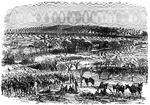
Kelley's Ford
"Kelley's Ford, on the Rappahannock, the scene of the Battle of the 17th of March, and of General Stoneman's…
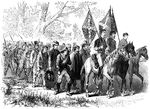
Confederate Prisoners
"Confederate Prisoners brought in after the Battle of Chancellorsville."— Frank Leslie, 1896
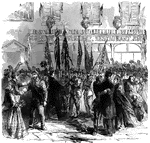
Soldiers Resting
"The soldier's rest--the friends of the Seventh and Eighth Regiments, New York Volunteers, welcoming…
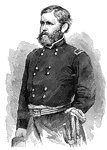
General William B. Franklin
"General William B. Franklin was a general in the Civil War."— Frank Leslie, 1896

Battle of Gettysburg
"Invasion of Pennsylvania- Battle of Gettysburg, Friday, July 3rd, 1863."— Frank Leslie, 1896
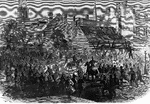
Invasion of Maryland
"The invasion of Maryland- citizens of Baltimore barricading the streets, Monday evening, June 29th,…

War in Virginia
"The war in Virginia--railroad bridge over the Rappahannock, at Rappahannock Station."— Frank Leslie,…

Manassas
"The war in Virginia--General Hooker's army marching past Manassas, Va., June, 1863."— Frank Leslie,…
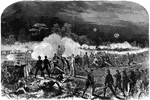
Grant's Campaign
"Grant's Campaign in Virginia. Repulse of Lee's night attack on Smith's Brigade, Hancock's Corps, Friday,…
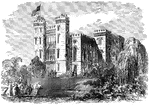
Banks's Expedition
"Banks's Expedition- Executive Officer Parker, of the United States gunboat Essex, hoisting…
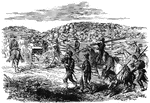
Southern Caricature
"A southern caricature- 'Generals Wheeler and Wharton falling slowly back, contesting every foot of…

War in Mississippi
"The war in Mississippi- defeat of Wirt Adams's Confederate cavalry by the Second Wisconsin cavalry,…
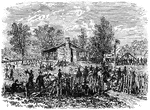
McPherson's Troops
"The war in Mississippi- McPherson's troops foraging at the Confederate General Whitfield's headquarters."—…
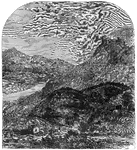
War in Tennessee
"The war in Tennessee- Lookout Mountain and its vicinity, from the position of the Eleventh Army Corps."—…
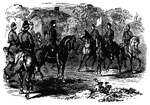
Flag of Truce
"Flag of Truce from the Confederates for a suspension of firing, to bury their dead, at Port Royal,…
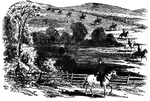
Blue Ridge
"Cavalry skirmishers advancing on the Confederate position in the pass of the Blue Ridge."— Frank…

Roswell's Ferry
"The war in Georgia- the Sixteenth Army Corps fording the Chattahoochee at Roswell's Ferry, July 10th,…

Fort Wagner
"Siege of Charleston, S. C.- Federal sharpshooters approaching Fort Wagner before the avacuation."—…
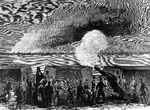
Siege of Charleston
"Siege of Charleston- the doomed city fired by Gillmore's explosive shells from Fort Putnam, January…

Hospital
"The war in Virginia--hospital scene after the Battle of Bristoe Station."— Frank Leslie, 1896
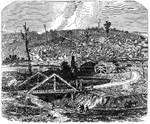
Canton Road
"The war in Mississippi- General McPherson driving the enemy from their position on the Canton Road,…
!["Siege of Petersburg- the Ninth Corps charging on the enemy's works after the explosion of the mine, July 30th, 1864. Immediately after the explosion of the mine a hundred cannons opened along the Federal front, and at half-past five the Ninth Corps charged, carrying the fort with a part of the line on each side. The Second Division, which was in the centre, advanced and carried the second line a short distance beyond the fort, and rested, holding ground with the utmost determination. It was at the time the [African American] Division, under General White, was pushed forward and ordered to charge and carry the crest of the hill, which would have decided the contest. The troops advanced in good order as far as the first line, where they received a galling fire, which checked them, and although quite a number kept on advancing, the greater number seemed to become utterly demoralized, part taking refuge in the fort, and the remainder running to the rear as fast as possible. They were rallied and again pushed forward, but without success, the greater part of the officers being killed or wounded."— Frank Leslie, 1896](https://etc.usf.edu/clipart/11800/11856/petersburg_11856_mth.gif)
Siege of Petersburg
"Siege of Petersburg- the Ninth Corps charging on the enemy's works after the explosion of the mine,…

War in Louisiana
"The war in Louisiana- Battle of Mansfield, between General Banks and General Dick Taylor, April 8th,…
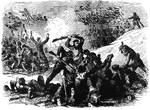
War in Tennessee
"The war in Tennessee- Confederate massacre of Federal troops after the surrender at Fort Pillow, April…


